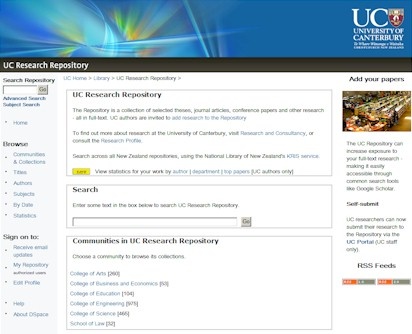Introduction
The UC Research Repository is an open-access database of original research authored by Canterbury academics, researchers and postgraduate students. The Repository exists to expose UC research to as wide an audience as possible, by providing free access to full-text research, through common internet search tools, such as Google Scholar and SCOPUS.
The Repository works as an archive for Canterbury research, and features a well-structured, search engine friendly database format. The Repository is integrated with the UC People & Research Database and the Research Profile. Our Repository is also a member repository of the National Library of New Zealand's Kiwi Research Information Service (KRIS).
Contents |
|---|
Getting your research into the Repository
You can add your research in one of three ways:
- Self submission via the UC People & Research Database
- Emailing the full-text research to the Repository, or your Information Librarian
- Using the thesis self-submission guidelines
Copyright clearance and preferred formats
While theses, conference papers, posters and working papers are normally acceptable in their final format, copyright is often an issue when it comes to making journal articles openly accessible via the web. In the vast majority of cases, copyright over an article is transferred to the journal publisher. Despite this, most journal publishers do allow authors to make their work open-access, albeit with some restrictions on the format of the paper you use.
In most cases, the publisher proscribes the posting of the final, published version of the paper on the Internet. However, the majority of large publishers do allow authors to use their final draft version of the paper, which should be identical in content, if different in formatting. In almost all cases where the use of the final draft is permitted, the publisher also insists on the inclusion of a set phrase that identifies the definitive version of the paper as their own, together with a link to their authorised version.
While this sounds like a lot of effort, we believe that these terms serve to get the articles out into the public realm, while protecting the interests of the publishers. While some of us might not agree with the idea of restrictions on access at all, this is a pragmatic solution - and a happy publisher is more likely to continue to support our authors than one that objects to placed it is a reasonable
Once your research has ben submitted, the Library carefully vets your submission for copyright compliance (checking the publisher's policy on open-access archiving), after which it is categorised using the Marsden Fund's subject classification scheme. Finally, the item is made live and will pop into public view.
What kinds of research do we collect?
The Repository accepts many types of scholarly output, and can handle accommodate written documents, images, video and audio recordings. The bulk of our collection consists of:
- books
- chapters in books
- conference papers (and powerpoint displays)
- journal articles
- reports
- theses (masters and doctoral)
- working papers
Finding out whether it works - statistics
While web statistics are less than 100% reliable, we wdo allow you to monitor the performance of your work in the repository.
You can find statistics for authors by College, School or department, view titles available in the Repository for any given author, or create a list of the 'top' items in the Repository as a whole, or by College, School and departmental units.
Please note that some of the hits on your work may be from search engines, which typically inflate the figures for you work in the first few weeks of its existence in the Repository. In our experience, the 'interference' from search engine hits becomes insignificant over time.
Software
The Repository uses Dspace, an open-source, OAI compliant tool created jointly by MIT and HP Labs. The software is maintained by the University of Canterbury's Library IT department, and by ICTS.
External sources
SHERPA - Clearing house for publisher copyright policies (Southampton University)
OAI - Open Archives Initiative, including the OAI-PMH protocol
